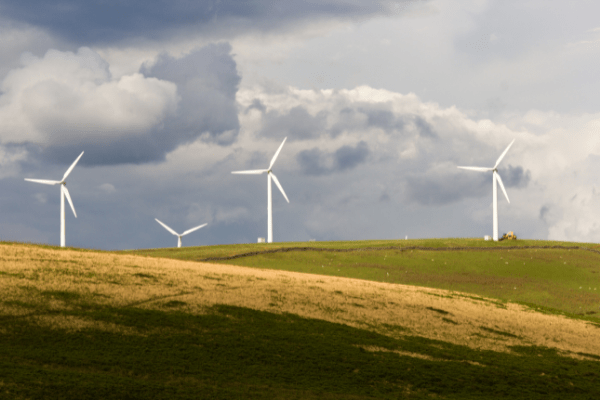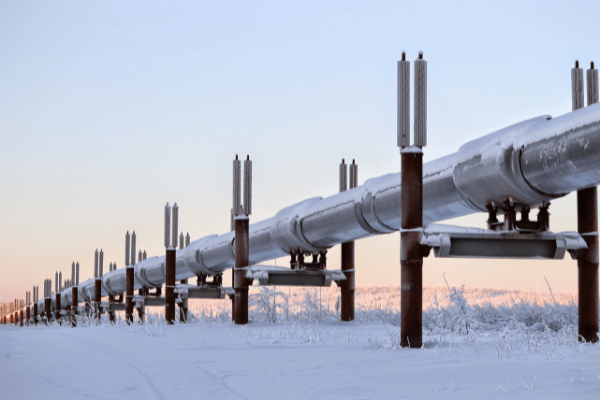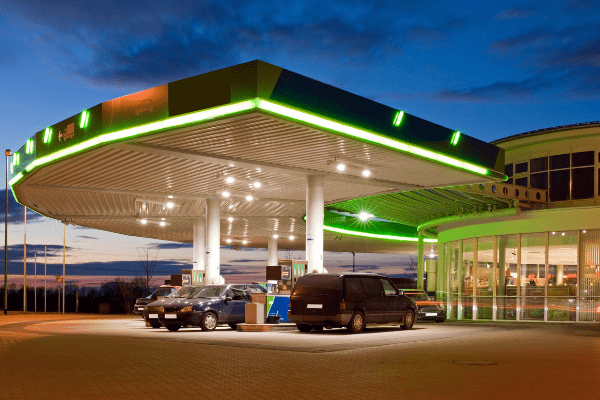The UK is facing an energy crisis not seen for generations as an accumulation of factors has lead to prices soaring and energy providers going bust.
Wholesale gas prices are up 420% – a phenomenal rise in costs that energy companies were not prepared for. At the start of the year, there were 70 energy providers in the UK; seven have now gone bust with others teetering on the brink of insolvency. Industry experts are pessimistic about the winter ahead with some even forecasting that there could only be ten providers by the end of the year.
Not only a problem with the supply of natural gas, other factors have exacerbated this issue. The UK has greatly invested in wind energy, which normally would make up 25% of its energy mix – well above the 8% in the EU. However, recent months have been less windy and wind production has dropped to 7%.

Wind farms in the UK have produced far less energy than usual. Credit: Canva
The crisis is not only faced by companies but also has a serious impact on individual consumers. To fully comprehend the issue, it is important to understand how energy rates are set in the UK.
The price cap
In 2017, the UK's energy market regulator Ofgem introduced a price cap that sets the maximum price that customers pay – a measure long called for to protect households from hikes in energy rates caused by fluctuations in global markets.
Crucially, this cap is calculated according to average wholesale energy prices (ie. what energy providers pay) over the previous six months. A new price cap will be introduced on 1 October but though this will rise, it will not fully account for today's greatly increased prices. This will have grave implications for both consumers, many of whom will see their bills rise by several hundred pounds, and energy providers who will still be selling energy at a loss.
This is the reason that so many energy firms are faltering: although they are increasing their rates, their own energy costs have exploded meaning that the increase in rates is insufficient to cover costs.
Moreover, the government has made clear its reluctance to assist smaller energy companies with Secretary of State for Business and Energy Kwasi Kwarteng stating: "I think they [smaller energy providers] should look to their own resources and their own management. I don't think it is right for companies that have entered the market recently to stretch out a hand for taxpayer money."
This resistance from the government to support smaller businesses is not unusual, with the Conservative Party focussing government assistance (in the form of taxpayer money) on more established players or businesses with personal connections to ministers. This has lead to accusations of cronyism from the Labour Party.
One energy firm, Green – that aimed to provide renewable energy at a low cost – released a statement on Wednesday in which they blamed their bankruptcy on 'the government failing to provide any support to smaller energy suppliers.' Industry ire was further stoked by the government's decision to bail out US company CF Industries with tens of millions of pounds in response to disruptions in food production chains.
The government's hardline approach to smaller suppliers has already left almost 1 million customers without an energy provider, Channel 4 News reports, with this figure rising rapidly.
A European problem
A shortage in natural gas is not isolated to the UK – Europe, too, is struggling to make up for a dwindling supply. This continental shortage is partly down to a colder winter and, in northern Europe, an inclement summer that lead to higher consumption.
However, the main issue is Europe's dependence on Norway and Russia for its natural gas with these countries providing 20% and 33%, respectively, of European supply. With both countries facing production difficulties, supply has been severely limited in recent months with Russia delivering only around one-quarter of what it would normally. Norway's natural gas output has also fallen well short of official forecasts.

A colder winter and natural gas shortages in Russia and Norway have affected all of Europe. Credit: Canva
Many European countries are feeling the effects of higher prices due to shorter supply. For instance, electricity costs for consumers in Spain has increased by 35% over the last year and Italy – which relies on natural gas for around 40% of its energy production – is braced for similar increases.
Belgium has so far escaped massive price increases and has one of the lowest costs for natural gas.
Related News
- Brexit: British food sales to EU suffered ‘disastrous decline’
- UK taxes on EU imports up 42%, British businesses bear Brexit costs
Brexit
Despite many nations being affected by the shortage, the UK's predicament has been made all the more acute by its exit from the EU. This means that it no longer benefits from the protection provided by the EU's internal electricity market, which essentially shares electricity between Member States and ensures that they all have advantageous energy prices.
Furthermore, the widely-reported shortage of heavy goods vehicle (HGV) drivers in the UK has severely disrupted supply chains, leading fuel companies BP and ExxonMobil to close their petrol stations temporarily.
Many HGV drivers who previously had come from the other European countries have chosen to avoid the UK and its more complicated entry procedures.
Whilst the government insists that the situation is under control and encourages consumers not to panic buy, petrol stations on the most important strategic routes are being prioritised.
A spokesperson for the government said that measures were being taken in response to the difficulties faced by the logistics sector, such as "increasing the number of driving tests for HGV drivers."

